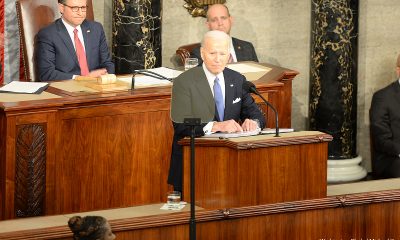News
Abigail Shrier tapped by Republicans as witness for Equality Act hearing
Hearing will mark first-ever testimony on bill before Senate


Abigail Shrier, who’s made activism against gender transitioning for transgender youth a personal crusade, has been tapped by Republicans as a witness for the upcoming the hearing on the Equality Act.
Shrier’s name appeared Tuesday on the names in the Senate Judiciary Committee’s website for the hearing on Wednesday. She’s has built a solid presence in conservative media as the author of “Irreversible Damage” and an expert on the harm she sees about medical practices allowing youth to transition,
Based on her past work, Shrier may discuss the Equality Act, which would expand the prohibition on discrimination against LGBTQ people under federal civil rights law, in terms of doctors having to provide transition-related care and parental consent for minors to undergo gender transition. Shrier didn’t immediately respond to a request to the Blade’s request comment on her upcoming testimony.
Meanwhile, the American Psychological Association last week adopted a new resolution opposing gender identity change efforts, also known as widely discredited conversion therapy for transgender youth. The APA also updated its resolution opposing efforts to change sexual orientation, originally adopted in 1997.
Shrier will take part in the second panel for the hearing, which consists of expert witnesses on the Equality Act. Joining Shrier as a Republican witness is Mary Rice Hasson, a fellow in Catholic Studies at the Ethics & Public Policy Center.
On the Democratic side, experts witnesses consist of Alphonso David, president of the Human Rights Campaign; Edith Guffey, a Kansas-based conference minister for the United Church of Christ; and Stella Keating, a transgender student from Tacoma, Wash.
David said in a statement the upcoming hearing will be “a historic opportunity to advance equality for all,” recognizing it will mark the first time the U.S. Senate has heard testimony on the Equality Act.
“The Equality Act is a unifying issue for our nation enjoying support from more than two-thirds of Americans and an unprecedented number of businesses who believe that not only is achieving equality the right thing to do but that it is also good business,” David added.
The first panel will consist of testimony of lawmakers on the Equality Act, including Rep. David Cicilline (D-R.I.) and Sen. Jeff Merkley (D-Ore.), the lead sponsors of the bill in their respective chambers of Congress.
Other Democrats who will testify are Sen. Tammy Baldwin (D-Wis.), the only out lesbian in the Senate, and Rep. Marie Newman (D-Ill.), who has a transgender son. Republicans who will testify are Rep. Vicky Hartzler (R-Mo.), Sen. Marsha Blackburn (R-Tenn.) and Sen. Cindy Hyde-Smith (R-Miss.).
The hearing before the Senate Judiciary Committee is set to begin Wednesday at 10 am.
National
United Methodist Church removes 40-year ban on gay clergy
Delegates also voted for other LGBTQ-inclusive measures

The United Methodist Church on Wednesday removed a ban on gay clergy that was in place for more than 40 years, voting to also allow LGBTQ weddings and end prohibitions on the use of United Methodist funds to “promote acceptance of homosexuality.”
Overturning the policy forbidding the church from ordaining “self-avowed practicing homosexuals” effectively formalized a practice that had caused an estimated quarter of U.S. congregations to leave the church.
The New York Times notes additional votes “affirming L.G.B.T.Q. inclusion in the church are expected before the meeting adjourns on Friday.” Wednesday’s measures were passed overwhelmingly and without debate. Delegates met in Charlotte, N.C.
According to the church’s General Council on Finance and Administration, there were 5,424,175 members in the U.S. in 2022 with an estimated global membership approaching 10 million.
The Times notes that other matters of business last week included a “regionalization” plan, which gave autonomy to different regions such that they can establish their own rules on matters including issues of sexuality — about which international factions are likelier to have more conservative views.
Federal Government
Republican state AGs challenge Biden administration’s revised Title IX policies
New rules protect LGBTQ students from discrimination

Four Republicans state attorneys general have sued the Biden-Harris administration over the U.S. Department of Education’s new Title IX policies that were finalized April 19 and carry anti-discrimination protections for LGBTQ students in public schools.
The lawsuit filed on Tuesday, which is led by the attorneys general of Kentucky and Tennessee, follows a pair of legal challenges from nine Republican states on Monday — all contesting the administration’s interpretation that sex-based discrimination under the statute also covers that which is based on the victim’s sexual orientation or gender identity.
The administration also rolled back Trump-era rules governing how schools must respond to allegations of sexual harassment and sexual assault, which were widely perceived as biased in favor of the interests of those who are accused.
“The U.S. Department of Education has no authority to let boys into girls’ locker rooms,” Tennessee Attorney General Jonathan Skrmetti said in a statement. “In the decades since its adoption, Title IX has been universally understood to protect the privacy and safety of women in private spaces like locker rooms and bathrooms.”
“Florida is suing the Biden administration over its unlawful Title IX changes,” Florida Gov. Ron DeSantis wrote on social media. “Biden is abusing his constitutional authority to push an ideological agenda that harms women and girls and conflicts with the truth.”
After announcing the finalization of the department’s new rules, Education Secretary Miguel Cardona told reporters, “These regulations make it crystal clear that everyone can access schools that are safe, welcoming and that respect their rights.”
The new rule does not provide guidance on whether schools must allow transgender students to play on sports teams corresponding with their gender identity to comply with Title IX, a question that is addressed in a separate rule proposed by the agency in April.
LGBTQ and civil rights advocacy groups praised the changes. Lambda Legal issued a statement arguing the new rule “protects LGBTQ+ students from discrimination and other abuse,” adding that it “appropriately underscores that Title IX’s civil rights protections clearly cover LGBTQ+ students, as well as survivors and pregnant and parenting students across race and gender identity.”
Rehoboth Beach
Former CAMP Rehoboth official sentenced to nine months in prison
Salvator Seeley pleaded guilty to felony theft charge for embezzlement

Salvator “Sal” Seeley, who served as an official with the Rehoboth Beach, Del., CAMP Rehoboth LGBTQ community center for 20 years, was sentenced on April 5 by a Sussex County Superior Court judge to nine months in prison and to pay $176,000 in restitution to the organization.
The sentencing took place about five weeks after Seeley pleaded guilty to a charge of Theft in Excess of $50,000 for allegedly embezzling funds from CAMP Rehoboth, a spokesperson for the Delaware Department of Justice told the Washington Blade.
Seeley’s guilty plea came shortly after a grand jury, at the request of prosecutors, indicted him on the felony theft charge following an investigation that found he had embezzled at least $176,000 from the nonprofit LGBTQ organization.
“Salvatore C. Seeley, between the 27th day of February 2019 and the 7th day of September 2021, in the County of Sussex, State of Delaware, did take property belonging to CAMP Rehoboth, Inc., consisting of United States currency and other miscellaneous property valued at more than $50,000, intending to appropriate the same,” the indictment states.
“The State recommended a sentence of two years of incarceration based on the large-scale theft and the impact to the non-profit organization,” Delaware Department of Justice spokesperson Caroline Harrison told the Blade in a statement.
“The defense cited Seeley’s lack of a record and gambling addiction in arguing for a probationary sentence,” the statement says. “Seeley was sentenced in Superior Court to a nine-month prison term and to pay a total of $176,000 in restitution for the stolen funds,” Harrison says in the statement.
Neither Seeley nor his attorney could immediately be reached for comment.
At the time of Seeley’s indictment in February, CAMP Rehoboth released a statement saying it first discovered “financial irregularities” within the organization on Sept. 7, 2021, “and took immediate action and notified state authorities.” The statement says this resulted in the investigation of Seeley by the state Department of Justice as well as an internal investigation by CAMP Rehoboth to review its “financial control policies” that led to an updating of those policies.
“As we have communicated from day one, CAMP Rehoboth has fully cooperated with law enforcement,” the statement continues. “At its request, we did not speak publicly about the investigation while it was ongoing for fear it would jeopardize its integrity,” according to the statement. “This was extremely difficult given our commitment to transparency with the community about day-to-day operations during the recent leadership transition.”
The statement was referring to Kim Leisey, who began her job as CAMP Rehoboth’s new executive director in July of 2023, while the Seeley investigation had yet to be completed, following the organization’s process of searching for a new director. It says Seeley left his job as Health and Wellness Director of CAMP Rehoboth in September of 2021 after working for the organization for more than 20 years.
“Mr. Seeley’s actions are a deep betrayal to not only CAMP Rehoboth but also the entire community we serve,” the statement says.



















